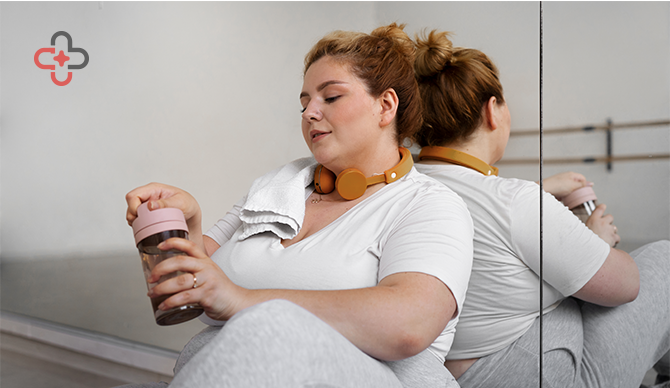In a city that never sleeps, metabolic health often takes a back seat. But if you live in NYC, you might be at greater risk of a hidden yet serious health issue of the metabolic syndrome.
What Is Metabolic Syndrome?
If you’ve ever wondered, What is metabolic syndrome?, you’re not alone. It’s a term that gets thrown around in doctor’s offices and wellness articles, but not everyone fully understands it.
Metabolic syndrome refers to a cluster of conditions that increase your risk for heart disease, stroke, and type 2 diabetes. These conditions include:
- High blood pressure
- High blood sugar
- Excess abdominal fat
- Low HDL (“good”) cholesterol
- Elevated triglycerides
If you have three or more of these risk factors, you likely meet the metabolic syndrome criteria. And while each issue on its own is manageable, together they spell a much bigger problem, particularly in urban centers like New York City, where high-stress lifestyles and poor diet habits often go hand in hand.
At Manhattan Primary Care, we regularly help New Yorkers identify and manage these risk factors through personalized, evidence-based healthcare.
Common Symptoms and Red Flags
Here’s the tricky part, metabolic syndrome symptoms are often subtle or completely silent in the early stages. But your body might still be trying to send you clues, including:
- Noticeable belly fat (increased waist circumference)
- Fatigue or low energy
- Frequent urination or increased thirst
- Brain fog or difficulty concentrating
These signs often creep up gradually and may be dismissed as just getting older or being tired from work. But especially in a city where people push through long commutes and workdays, these chronic disease symptoms deserve more attention.
What Causes Metabolic Syndrome?
The root causes of metabolic syndrome are layered and often tied directly to modern urban lifestyle habits. Living in NYC, for instance, means you’re likely exposed to:
- Sedentary work environments: Desk jobs and long subway rides mean you’re sitting for hours.
- Convenience-based food culture: From dollar slices to food trucks, it’s all too easy to grab processed, high-sugar meals.
- Chronic stress: Whether it’s traffic, work deadlines, or noise pollution, stress is a major factor.
- Poor sleep hygiene: Late nights, screen time, and shift work can wreak havoc on metabolic health.
- Genetics: Of course, your family history plays a role too—especially when combined with lifestyle factors.
So while the syndrome itself is not unique to city living, the urban environment absolutely increases your risk.
How to Diagnose Metabolic Syndrome?
Wondering, What are the 5 criteria for metabolic syndrome? Here they are, clearly defined:
- Waist circumference: >40 inches (men), >35 inches (women)
- Blood pressure: ≥130/85 mmHg
- Fasting blood glucose: ≥100 mg/dL
- HDL cholesterol: <40 mg/dL (men), <50 mg/dL (women)
- Triglycerides: ≥150 mg/dL
Diagnosis typically involves a routine physical exam, blood pressure screening, and blood tests. If you hit three or more of these markers, your doctor may diagnose you with metabolic syndrome.
The team at Manhattan Primary Care offers comprehensive diagnostic services including Annual Physicals, Lab Services, and Health Screenings to help you catch and address these issues early.
Metabolic Syndrome Treatment
Here’s the good news: there is hope. Metabolic syndrome treatment starts with long-term lifestyle changes:
- Exercise regularly: Aim for at least 30 minutes a day, most days of the week.
- Eat a balanced, whole-food diet: Lean proteins, vegetables, fruits, whole grains, and healthy fats.
- Cut back on sugar, processed foods, and trans fats
- Prioritize quality sleep and stress reduction
Some people may also require medications for blood pressure, cholesterol, or insulin resistance, but lifestyle is always the foundation of successful treatment.
At Manhattan Primary Care, we provide tailored treatment plans that combine nutrition counseling, medical support, and lifestyle coaching, including Weight Management, Chronic Disease Management, and Preventive Care services to help you manage and even reverse the syndrome.
Reversing Metabolic Syndrome: Is It Possible?
Absolutely. If you’re wondering, Is metabolic syndrome reversible?, the answer is a strong yes for many people. Key strategies include:
- Weight loss: Even a 5-10% drop in weight can make a major difference
- Improved diet: Follow a Mediterranean or DASH (Dietary Approaches to Stop Hypertension) eating plan
- Regular check-ins: Keep up with blood work and screenings
- Work with pros: A registered dietitian, primary care physician, or endocrinologist can help guide your path
So if you’re serious about finding a metabolic syndrome diet plan and sticking to it, you’re already ahead of the game.
Conclusion
Metabolic syndrome is both preventable and manageable, but the first step is awareness. Especially in high-stress environments like NYC, recognizing your risk is half the battle.
Left unchecked, this condition can snowball into serious chronic illnesses. But with the right mix of healthy habits and medical support, you can reverse metabolic syndrome and reclaim your health.
If you’re concerned about your risk, reach out to Manhattan Primary Care to schedule a comprehensive wellness screening. Our dedicated team is here to help you take control of your metabolic health and thrive in the city.
Frequently Asked Questions
Can young adults get metabolic syndrome?
Yes, it’s increasingly seen in people under 40 due to poor diet, inactivity, and stress.
Does alcohol increase metabolic syndrome risk?
Excessive drinking can raise triglycerides and liver fat, worsening risk factors.
Are there visible signs beyond belly fat?
Yes, skin tags, dark patches (acanthosis nigricans), and ankle swelling may appear.
Can intermittent fasting help?
For some, yes. IF may improve insulin sensitivity and reduce waist size when done safely.
Are there helpful apps for managing it?
Definitely. Apps like MyFitnessPal, Zero, and wearable health tech can track key metrics.
Disclaimer
This blog is for informational & educational purposes only and does not intend to substitute any professional medical advice or consultation. For any health-related concerns, please consult with your physician, or call 911.
